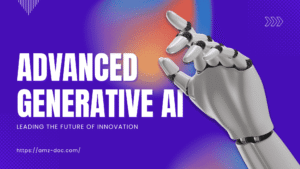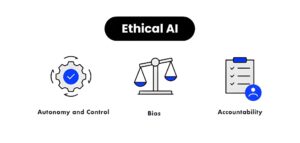
Amazon Web Services (AWS), as the leading cloud computing platform, is already a powerhouse of technological advancements. The integration of Artificial Intelligence (AI) into AWS has opened new horizons, transforming the way businesses and developers operate. The potential future developments in AI for AWS promise to revolutionize industries further, fostering innovation and efficiency. In this article, we explore the possibilities that AI could bring to AWS in the coming years.
1. Enhanced AI-Powered Automation
AI is central to automation, and AWS is expected to expand its AI-powered automation capabilities. Future advancements may include:
- Self-healing systems: AI could monitor cloud infrastructure continuously, predicting and automatically resolving issues before they impact performance.
- Advanced DevOps tools: AI-driven tools might streamline development workflows by automating testing, deployment, and monitoring processes.
- AI-assisted configuration: Automating complex configurations and optimizing resources without manual intervention could save significant time for developers.
These innovations would allow businesses to focus on strategic tasks, reducing operational burdens.
2. Improved Machine Learning Models
AWS already offers robust machine learning services like SageMaker. Future enhancements could include:
- Pre-trained industry-specific models: Expanding pre-trained AI models tailored to niche industries such as healthcare, finance, and manufacturing.
- Federated learning: Enabling secure, decentralized training of AI models across multiple devices without sharing raw data.
- Automated model evolution: AI could evolve and improve machine learning models dynamically, reducing the need for manual retraining.
These developments would democratize AI adoption, making it accessible to businesses of all sizes.
3. Next-Generation AI Security Solutions
As cyber threats grow more sophisticated, AI’s role in security is becoming indispensable. AWS could introduce:
- AI-driven threat detection: Identifying unusual patterns and potential vulnerabilities in real-time.
- Automated incident response: AI systems could analyze, contain, and mitigate security incidents autonomously.
- Advanced encryption techniques: Leveraging AI to develop stronger encryption and secure data in the cloud.
These innovations would enhance trust and reliability in AWS’s cloud services.
4. Smarter Data Analytics
Data analytics is at the core of AWS’s offerings, and AI could make this service smarter by:
- Real-time insights: Leveraging AI to provide instant insights from large datasets.
- Predictive analytics: AI could forecast trends, helping businesses make proactive decisions.
- Data storytelling: Automating the creation of visualizations and narratives from data, making it easier for non-technical users to interpret.
Enhanced analytics would empower businesses to derive actionable insights faster and more effectively.
5. Personalized User Experiences
AI can make AWS’s services more intuitive and user-friendly by:
- AI-driven dashboards: Personalized interfaces that adapt to users’ needs and preferences.
- Natural language processing (NLP): Allowing users to interact with AWS services using plain language queries.
- Intelligent recommendations: Providing tailored suggestions for optimizing resources and improving performance.
These features would simplify cloud management, even for non-expert users.
6. AI-Powered Edge Computing
With the rise of IoT (Internet of Things), edge computing is becoming increasingly important. Future developments in AI for AWS could include:
- Real-time decision-making: AI models at the edge could analyze and act on data instantly, without relying on centralized cloud systems.
- Efficient resource utilization: Optimizing processing power and energy usage on edge devices.
- Scalable edge solutions: Making it easier to deploy and manage AI applications across numerous devices.
These advancements would enable faster and more efficient processing for IoT applications.
7. AI for Sustainable Computing
Sustainability is a growing focus for AWS, and AI could play a pivotal role in:
- Energy optimization: AI algorithms might manage energy consumption across AWS data centers, reducing carbon footprints.
- Eco-friendly infrastructure planning: AI could analyze patterns to design more sustainable data center layouts and operations.
- Green coding practices: Recommending energy-efficient coding methods for developers using AWS.
These developments align with global efforts to combat climate change.
8. Revolutionizing Customer Support
AI could redefine how AWS supports its users by:
- Advanced chatbots: AI-driven bots could handle complex queries with conversational accuracy.
- Proactive support systems: Predicting and addressing issues before customers notice them.
- Personalized learning resources: AI could curate training materials based on users’ skill levels and goals.
Such advancements would improve customer satisfaction and engagement.
9. AI-Powered Cloud Cost Optimization
Managing cloud expenses is a challenge for many businesses. Future AI tools in AWS could:
- Analyze usage patterns: Providing detailed insights into cost drivers.
- Suggest cost-saving measures: Recommending specific changes to optimize spending.
- Automate scaling: Adjusting resource allocation dynamically based on usage patterns.
These tools would help businesses maximize their ROI on cloud investments.
10. Future Innovations in Quantum Computing
AWS has already ventured into quantum computing with Amazon Braket. AI could enhance this domain by:
- Quantum machine learning: Leveraging quantum computers for faster AI model training.
- Error correction: Using AI to improve the reliability of quantum computations.
- Simplifying quantum programming: Making quantum computing more accessible to developers.
These breakthroughs could unlock new possibilities for solving complex problems.
11. AI-Enhanced Collaboration Tools
AI could improve AWS’s collaboration tools by:
- Smart project management: Automating task allocation and progress tracking.
- AI-driven documentation: Creating and maintaining accurate project documentation effortlessly.
- Virtual assistants: Helping teams manage schedules, deadlines, and resources.
These features would streamline teamwork and productivity.
12. Semantic Keyword Integration in AWS Services
Incorporating semantic keywords into AWS’s AI-driven tools could:
- Improve search accuracy: Making it easier for users to find relevant services and resources.
- Enhance discoverability: Helping businesses optimize their content for better visibility.
- Support multilingual capabilities: Allowing global users to interact with AWS in their preferred languages.
Semantic keyword integration would make AWS services more accessible and efficient.
13. Augmented Reality (AR) and Virtual Reality (VR) Solutions
AI could enable AWS to offer cutting-edge AR and VR solutions by:
- AI-powered content creation: Automating the development of immersive experiences.
- Optimized rendering: Enhancing the quality and speed of AR/VR applications.
- Real-time interactions: Using AI to create dynamic, interactive virtual environments.
These technologies would open new opportunities in gaming, education, and training.
Conclusion
The future of AI in AWS is brimming with possibilities. From automating workflows and enhancing security to driving sustainability and revolutionizing customer support, AI will continue to shape the evolution of AWS. By embracing these advancements, AWS will not only maintain its position as a leader in cloud computing but also empower businesses worldwide to innovate and thrive in an increasingly digital landscape.
FAQs: What Future Developments Could AI Bring to Amazon Web Services (AWS)?
1. How will AI improve automation on AWS?
AI could bring more advanced automation tools to AWS, enabling businesses to streamline operations, such as resource scaling, application deployment, and anomaly detection, with minimal manual intervention.
2. Could AI enhance AWS’s data analytics capabilities?
Yes, AI advancements could offer real-time insights, predictive analytics, and automated data processing pipelines, making it easier for businesses to derive actionable intelligence from large datasets.
3. Will AI improve security on AWS?
AI could revolutionize AWS security by using machine learning to detect threats, monitor unusual activity, and implement automated responses, improving overall cybersecurity.
4. How might AI optimize resource usage in AWS?
AI algorithms could analyze usage patterns to recommend cost-saving configurations, optimize storage and compute resources, and ensure efficient energy utilization.
5. Can AI improve AWS’s support for developers?
Future AI tools could include intelligent coding assistants, automated debugging, and natural language-based interfaces, simplifying the development process for AWS users.
6. What role will AI play in sustainability efforts for AWS?
AI could monitor energy consumption and carbon footprints, offering suggestions for greener cloud computing practices and contributing to AWS’s sustainability goals.
7. Will AI make AWS services more accessible to non-technical users?
AI could introduce intuitive, no-code or low-code platforms on AWS, making it easier for users without technical expertise to build applications and leverage cloud resources.
8. Could AI improve personalization in AWS services?
Yes, AI could tailor AWS recommendations for customers, such as suggesting the best services or configurations based on their specific needs and usage patterns.
9. How might AI and quantum computing integrate into AWS’s future?
AI could complement quantum computing by providing solutions to complex optimization and simulation problems, potentially making quantum capabilities accessible on AWS.
10. Will AI lead to industry-specific AWS tools?
AWS could use AI to develop tailored solutions for industries like healthcare, finance, and retail, offering customized tools to address unique challenges and requirements.





